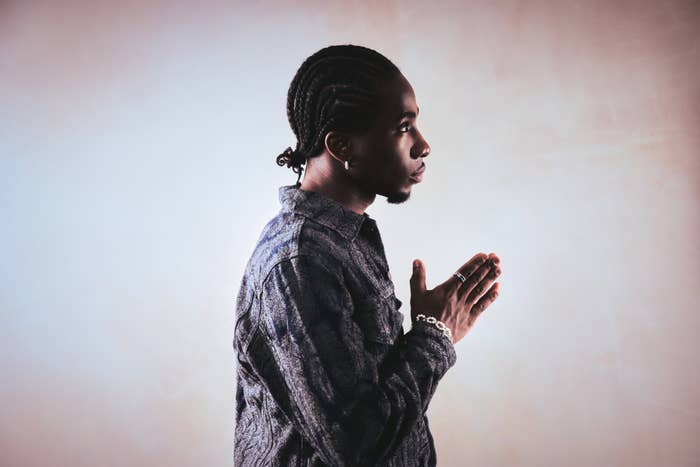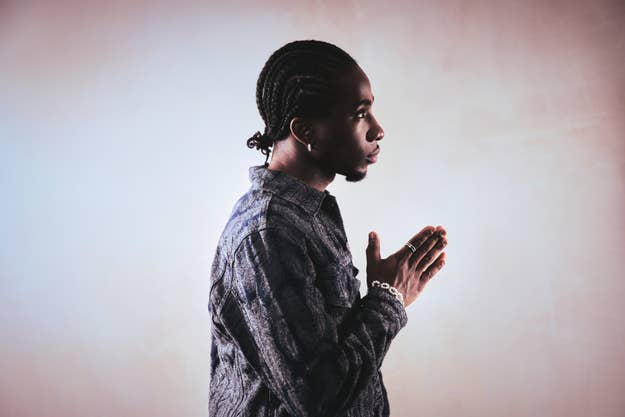
Now more than ever, with the world’s attention span capped at no more than fifteen seconds, consistency and versatility are instrumental in setting emerging artists apart and helping them stand out from the crowd.
One artist who has successfully balanced the art of surprising listeners and giving them what they want is 24-year-old British-Nigerian talent JayO, the multi-genre multidisciplinary behind one of the year’s biggest breakout singles, the seductive Afro-dancehall cut “22”. Although it may seem as though the TikTok-friendly singer/songwriter popped out of nowhere, his career has been over a decade in the making. Curious and creative, the North London native’s journey has been carved by a willingness to venture beyond the norm, armed with the knowledge and security of what artist he is and what he wants to be. Recently signed by homegrown UMG imprint 0207 Def Jam, joining a heavy roster that includes Stormzy, Potter Payper, Debbie and more, he has been ready and waiting for his moment in the sun.
Sitting at the crux of the cross-continental ‘Afro-R&B’ scene that blends Alté, Afrobeats and R&B, JayO’s lover boy lyrics have proven a hit, with “22” sitting at 62 million plays on Spotify alone and its follow-ups “Back” and “Often” picking up traction across YouTube. Off the back of a whirlwind year, we sat down with JayO to talk about the winning formula for a hit, the growing number of UK and African collaborations, his creative process, and more.
“Going to church as a child opened my eyes and ears. I was never in the choir—I was a nuisance!—but I was able to understand key musical terms and pay attention.”
View this video on YouTube
COMPLEX: You seemingly popped out of nowhere last year with your first hit single, “XO”, followed by this year’s massive “22”, but you’ve actually been working towards this for a while. Tell us about that journey.
JayO: I’ve been at this since I was 12 years old, with my producer and close friend, RZ. We know what it’s like to have everything in position and play the waiting game—this hasn’t been overnight. I started making music with RZ in his shed when we were younger. His older brother is an Afrobeats producer, so the set-up was already there and, before long, we started making music at the local youth club and my confidence grew. I’ve always been a go-getter; once, I drove to Belgium to collaborate with an artist I had come across on social media called BryanMg. It wasn’t a matter of management linking us up, but me seeing the value of tapping into the European market and also liking his music.
You and your peers, such as Odeal and Gabzy, seem to be leading the charge on ‘Afro-R&B’, which seems like an evolution of the Afroswing sound that you were making five or six years ago.
The UK’s in a great place right now. I think the key is finding a balance between constantly releasing music but then keeping the music you release to a high standard, so quality over quantity—but quantity is still so important. Odeal and I have been friends for over a decade; that’s my brother! We went to university together as well. Everyone I’m coming up with is like a brother to me already, so it’s nice to be doing it together because we all know how hard we’ve worked to get here. They’ve inspired me to keep on going at points… I’m less focused on making music that fits into a genre, and more about making music that makes people feel good. I grew up with my sister’s iPod, scrolling through all sorts, then listening to music at family parties—from Wizkid to Kendrick to Marvin Gaye. Going to church as a child also opened my eyes and ears. I was never in the choir—I was a nuisance!—but I was able to understand key musical terms and pay attention. My SoundCloud shows that me and RZ have tried literally every single genre. Being from Tottenham and a Nigerian household, I was always surrounded by the music that I make, plus I’ve been conscious of working with African artists straight from the jump.
You spent some time in both Nigeria and Ghana this year—how was that for you?
I went back to Nigeria for the first time in ten years this year, which was crazy because I used to go so much as a kid, and my trips there grew my love of music. Now, I’m going back as an artist. I didn’t manage to get in the studio in Nigeria but I had my own little set-up with me, and in Ghana, we were at a writing camp in the mountains. The work ethic of the producers was super-inspiring and it’s cool to see how the music ecosystem there works in comparison to here. There are a lot of collaborations at the moment between UK and Nigerian artists, which is great, but I want any track I make with a Nigerian or African artist to be worth it—worth going out there and filming a video, worth putting out. It needs to lay the groundwork for something bigger. Like everything I do, it has to be intentional, organic and align with who I am as a person, as well as my music. I worked with Adekunle Gold on a remix of “Party No Dey Stop” alongside Byron Messia and I didn’t even tell my mum [laughs]. But one of my aunties had pointed it out to her, because it was Adekunle Gold. I don’t tell my mum about my songs; she keeps up with my Instagram. Music like that, with an artist like that, that crosses generations and continents and stands up by itself with no hype or clout, is what I want to collaborate on.
View this video on YouTube
Did you always plan on making a career out of music?
Music was always the goal. Funnily enough, my mum tried to convince me to do an apprenticeship, instead of going to university. It’s usually the other way round, but I wanted the university experience of moving out and being independent so I studied a marketing and business degree. I’ve definitely used the skills I learnt from that degree in my music career.
Something that I’ve noticed is that you’re quite visible—whether it’s popping out to perform at The Compozers’ sold-out show at The Royal Albert Hall, or turning up to support at Odeal’s listening party…
—I’ve had my fair share of parties [laughs]. It’s easier to connect on the basis of being sociable. I’ve thrown parties in my time, and attended just as many. Being out and about helps me meet and connect with other creatives, and I like to see how my music connects in real time. It helps me understand music better, because I want what I create to be associated with positive memories and feel-good experiences.
What’s JayO’s creative process like?
I take inspiration from my life, from having fun. When I made “22”, for example, I was drawing on that part of my life: being 22 and out and about. I’ll watch people when I’m at a party just to understand how I can make my music appeal in a personal and relatable way. My notes app is where I keep all my musings and inspiration—it could be as simple as overhearing a conversation from somebody in the club or seeing a tweet on my timeline that makes me think and triggers the writing process. My Twitter bookmarks are full of quotes that make me think! I want to feel good when I make and listen to my music. My creative process is continuous because I’m always listening out, leaning in, and learning. And I always creatively contribute to my music videos.
“I actually wanted to be an A&R before I became an artist myself, having been around so many talented people and recognising their talent.”
Something that a lot of people might not know is that you produce music as well. Do you see yourself exploring that side of your artistry more as you grow?
I think my experience has helped me work out the ‘formula’ for what makes a good song; like, when I produced “22”, I knew it would hit the streets because of a combination of the production, the lyrical matter, etc. I actually wanted to be an A&R before I became an artist myself, having been around so many talented people and recognising their talent. Once I’ve achieved certain milestones and explored my full potential as an artist, I want to produce for others in an intentional way. I want to get the perfect person for my best beats, or I might as well keep them for myself! I’ve done a lot of self-producing and, more often than not, I’ll start a track then get RZ or somebody else I’ve worked with, like TSB, to finish it off. I produced “Fine China” and co-produced “Issa Vibe” and there will definitely be some self-produced stuff on the upcoming EP.
Do you feel any pressure to prove yourself against any one-hit-wonder assumptions considering you’ve had two singles go viral on social media?
Social media has helped me to discover so many underground scenes and cultures that I wouldn’t usually encounter in my day-to-day life, as well as helped me connect with others to share my music. I love using it, and do all of my social media posting myself: the filming, the editing, etc. In terms of being a one-hit-wonder due to my virality, I already have the catalogue going back years to prove that I haven’t come out of nowhere. If you consistently keep on making good music, one hit a year is great for an artist! My success isn’t a fluke—it’s the result of consistency and catalogue.
You’ve released a flurry of singles, performed all over the world and achieved the commercial success that you’ve worked so hard and long for. What’s next for JayO?
Expect an EP early next year! I’m used to teasing music online and keeping it for the “right time.” Even my latest release, “Often”, is something RZ and I were working on for a while. My sound will always be sultry and sensual, because I want to feel tropical when I listen to my music. There will be elements of Afrobeats, dancehall and the proper R&B that makes people sing in the rain!



